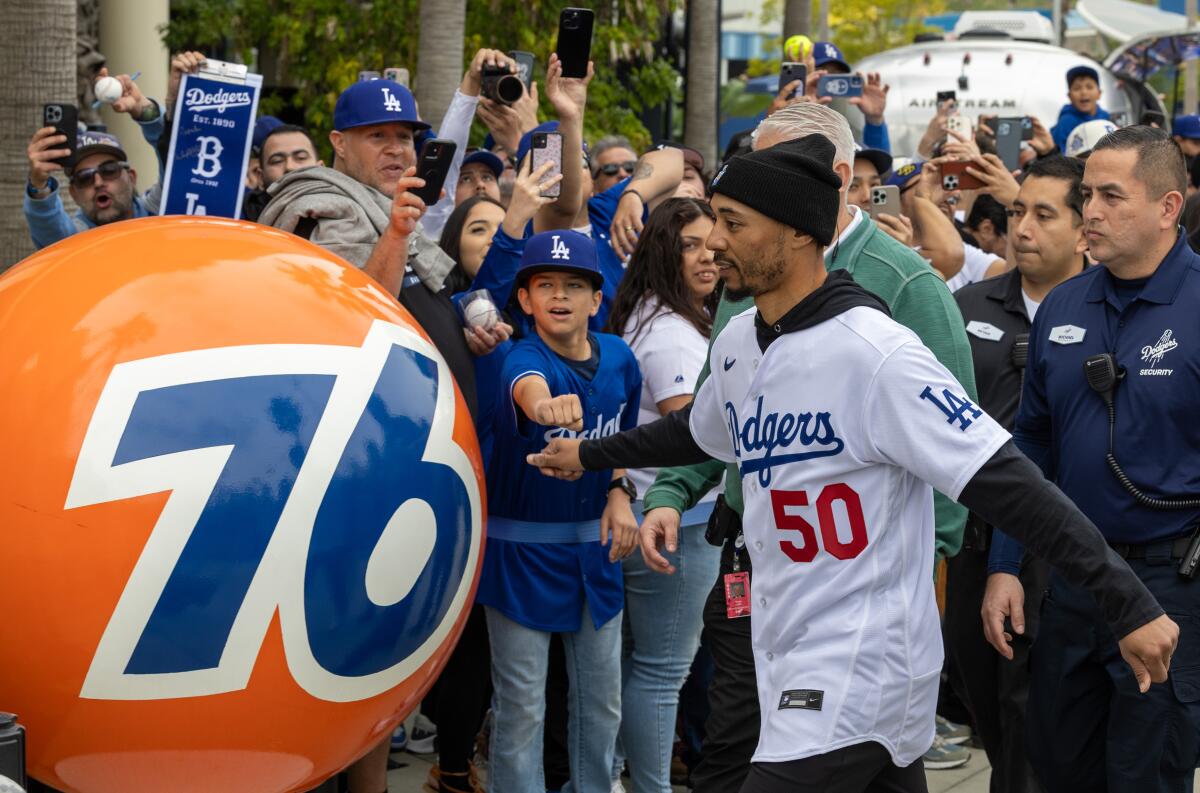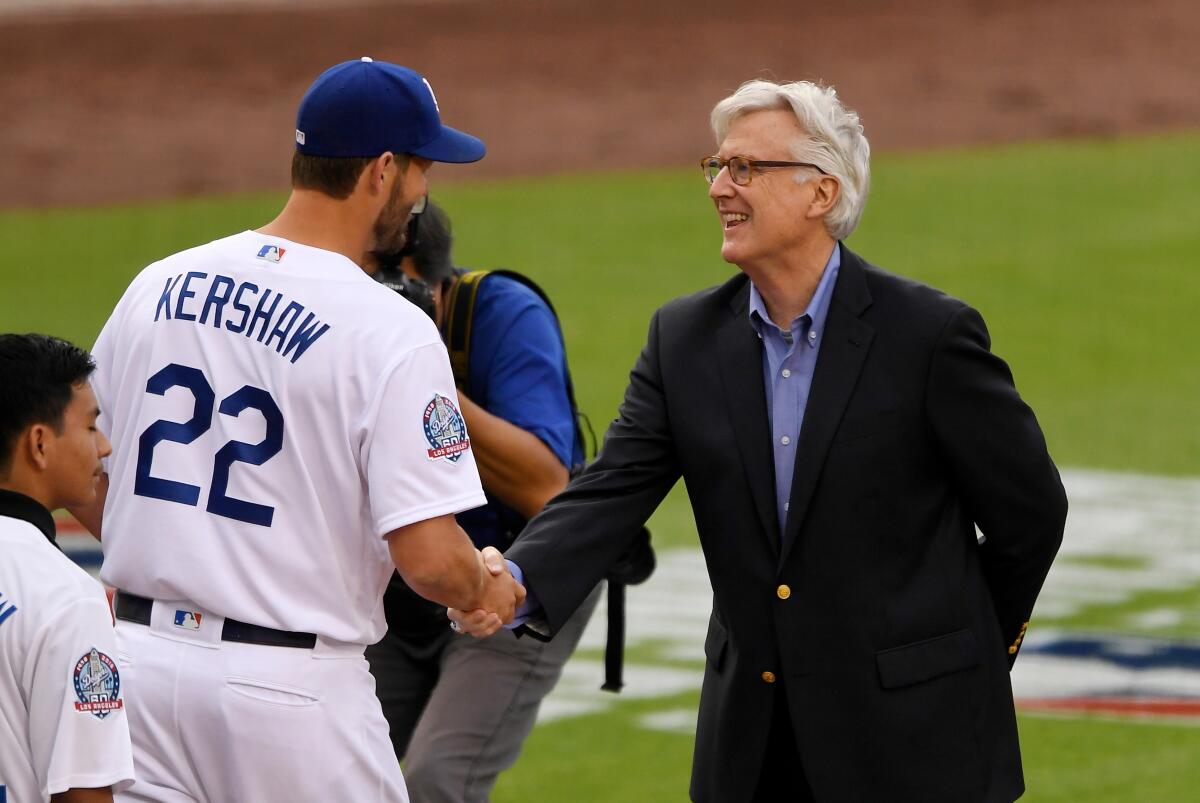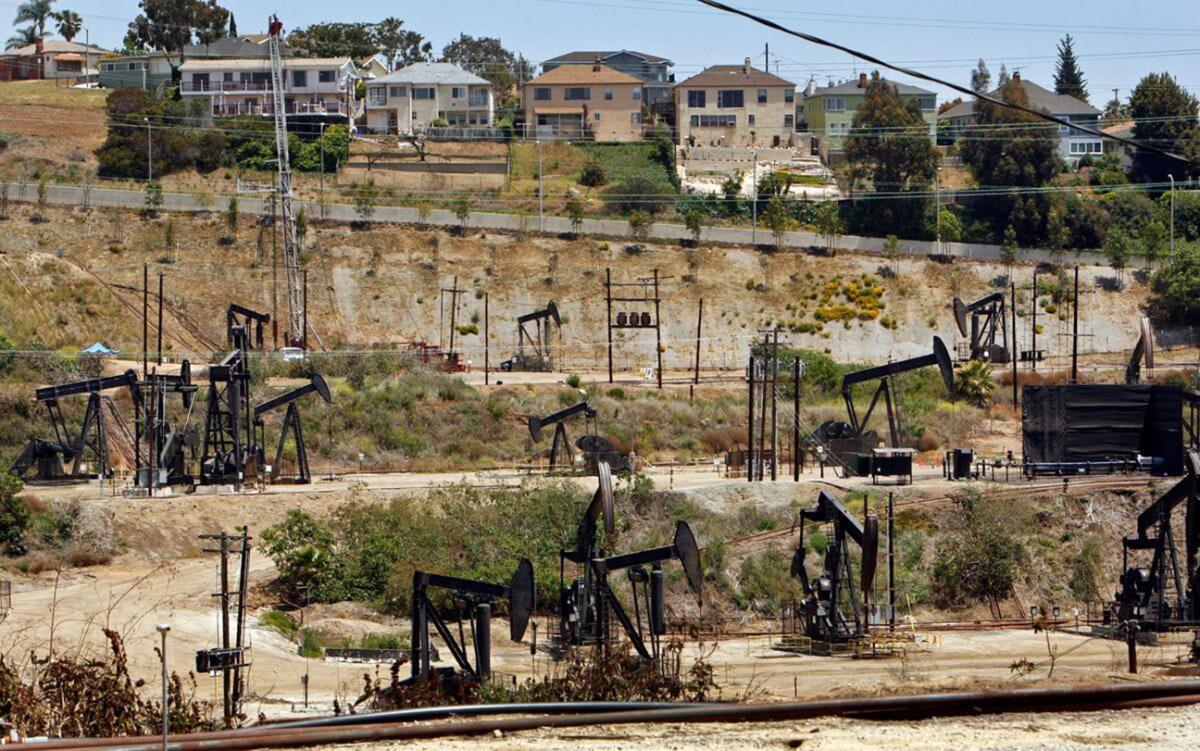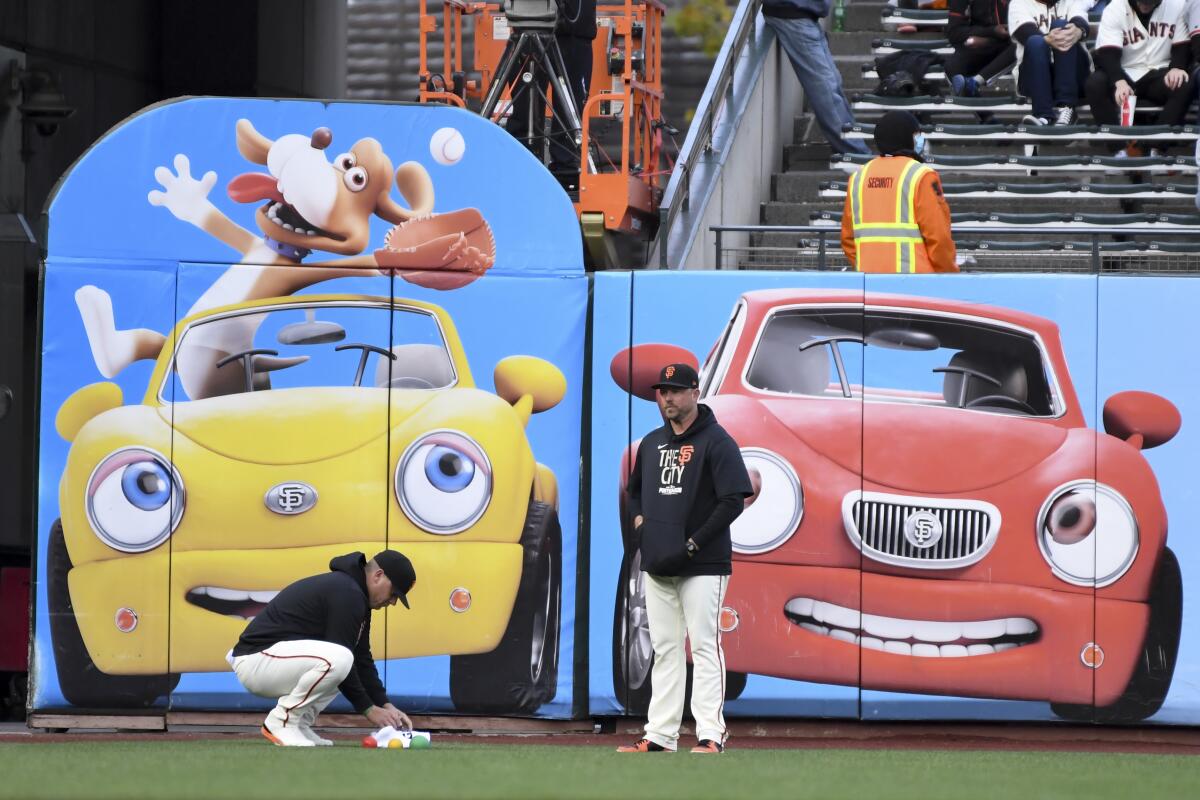Column: Activists and celebrities urge Dodgers to dump oil industry advertiser

- Share via
For the record:
12:08 p.m. Aug. 8, 2024A previous version of this post said that U.S. Rep. Katie Porter (D-Irvine) had signed a letter urging Los Angeles Dodgers owner Mark Walter to end a sponsorship deal with Phillips 66, owner of the 76 gasoline station chain. Porter’s office said she did not sign the online petition.
What do Emmy Award-winning actor Kyra Sedgwick, environmental groups Friends of the Earth and the Rainforest Action Network, the Doors’ former drummer John Densmore, acclaimed climate change activist Bill McKibben and “Anchorman” director Adam McKay’s Yellow Dot Studios have in common?
They all want to see the Los Angeles Dodgers drop an oil industry advertiser.
In a letter made public Tuesday, dozens of people and groups called on the team’s owner, Mark Walter, to end a sponsorship deal with Phillips 66, owner of the 76 gasoline station chain. Previously known as Union 76, the chain’s orange-and-blue logo has been a fixture at Dodger Stadium since the ballpark opened, and currently occupies prime real estate above both scoreboards.
You're reading Boiling Point
Sammy Roth gets you up to speed on climate change, energy and the environment. Sign up to get it in your inbox twice a week.
You may occasionally receive promotional content from the Los Angeles Times.
But with Earth recently suffering through 13 straight months of record heat — and with raging megafires, torrential floods, toxic air pollution and other deadly consequences of fossil fuel combustion ravaging people and the planet — some Angelenos believe it’s time for Walter to put their health and safety above the easy profits that come from doing business with Big Oil.
South Central L.A. resident Jordan Howard, who signed the open letter, lives a mile from a Phillips 66 filling station just off the 110 Freeway, where trucks carrying cargo to and from the Los Angeles and Long Beach ports stop to refuel. Phillips 66 also operates a South Bay oil refinery — as does Marathon Petroleum, which advertises its Arco gas stations at Dodger Stadium.
Those are two of many companies fouling the air breathed by Black, brown and low-income families in south L.A. County — to the detriment of people like Howard. She’s been diagnosed with lupus, which can be caused in part by environmental factors.
“I’m walking the dog [on a hill], and I see the El Segundo refinery,” Howard told me, referring to yet another highly polluting fossil fuel facility, this one belonging to Chevron. “As soon as I hit the other corner, I can see the Marathon refinery in Carson.”
Is Howard a Dodgers fan? Of course. There’s a bobblehead of former Dodgers first baseman and current broadcaster Eric Karros on her mantle. She’d like to see the team “be part of the solution” and “find a business model that doesn’t enable extraction.”
“Don’t pledge your allegiance to the corporations that are causing harm,” she said.
The question now: Will Walter listen?
When I first wrote about the problematic nature of the Dodgers’ continued partnership with Phillips 66, the team didn’t respond to my request for comment. When I followed up with a column criticizing the team’s official charity for taking money from Phillips 66 and Marathon Petroleum to fund health and education programs for kids — a column that spurred activist Zan Dubin to write the open letter to Walter and start soliciting signatures — the team’s ownership group again declined to weigh in.
The silence continues. I asked the Dodgers for comment for this story and got nothing.
I wonder if the letter will change the equation for Walter — especially if the list of signatories continues to grow.

In addition to the folks I mentioned earlier, early signatories include the Center for Biological Diversity, former Culver City Mayor Meghan Sahli-Wells, science historian Naomi Oreskes, public radio broadcaster Warren Olney and “MASH” actor Mike Farrell.
When I asked McKibben why he signed the letter, he offered a simple response.
“Baseball is the great American pastime,” he said. “What a shame to see it tainted with the thing that’s destroying summer, and making it impossible for us to relax and recreate the way that all who came before us in this country were able to.”
If that sounds hyperbolic, you’re not paying attention.
It was so hot in July that Las Vegas — future home of Major League Baseball’s Oakland Athletics — hit 120 degrees, breaking the old record by 3 degrees. Death Valley recorded the hottest month ever measured anywhere, with an average temperature of 108.5 degrees. Needles, Calif., home to Snoopy’s brother Spike — averaged 103.2 degrees, shattering Phoenix’s all-time mark for the hottest month for any U.S. city. Earth suffered through its hottest day on record — then broke the record the next day.
Anecdotally, I took a bunch of friends to a Sunday afternoon Dodgers game in July. We were sitting in direct sunlight, and most of them couldn’t stand the scorching heat. They spent the majority of the game secluded in shaded areas under the stands.
What will happen as the planet gets even hotter?
“Sitting out in the sun on a hot summer day is tradition. But it doesn’t work when it’s 109,” McKibben said.
Fossil-fueled heat waves and other increasingly extreme weather events can be a menace for athletes too. Reporting from Paris, The Times’ David Wharton described the Olympic Games as “the latest in an Olympic trend that has winter athletes scrambling to find enough snow and their summertime counterparts facing health risks — cramping, vomiting, heat stroke.”
“We are in a race against time,” wrote Sebastian Coe, a former Olympian and head of the international track federation. “Whilst global temperatures continue to rise, climate change should increasingly be viewed as an existential threat to sport.”
Back home, the oil and gas companies fueling the climate crisis also damage the lungs of vulnerable kids and parents.
Morgan Goodwin fights to protect those families. As director of the Sierra Club Angeles Chapter, he’s helped lead campaigns — all works in progress — to end oil drilling in Culver City, Signal Hill and across L.A. County. Researchers have found that living near oil and gas wells can increase the risk of health problems such as asthma and preterm birth — and possibly much worse.

By implicitly endorsing those companies, Goodwin said, Walter is sending a message to Dodgers fans.
“It’s like the Dodgers are giving their 16-year-old a new car with a set of keys and a bottle of rum and saying, ‘Go for it!’” he said.
But if Walter were willing to stop taking money from Phillips 66 and Marathon Petroleum, the Dodgers owner could help clean up Southern California’s filthy air — saving who knows how many lives, and preventing who knows how many tragic illnesses.
I’m not saying the Dodgers are to blame for Big Oil’s misdeeds.
But by selling ads to Phillips 66 and Marathon — both of which are mentioned in a lawsuit filed by California officials accusing oil companies of a “decades-long campaign” of climate deception — Walter is enabling “sportswashing.” That’s the sports version of greenwashing, a tried-and-true tactic for industries facing public relations crises, such as tobacco. Knowing the future looks bleak, they seek to buy goodwill, and influence public policy, by associating themselves with beloved brands such as sports teams.
So long as folks like Walter are willing to keep taking their money, it often works.
“When you have that nice, warm, fuzzy, orange 76 [at Dodger Stadium] — it sets the tone for everything else,” Goodwin said.
As a climate journalist, I find the whole thing demoralizing. As a die-hard Dodgers fan, I find it absurdly frustrating. It drives me crazy to see my favorite players — Mookie Betts, Freddie Freeman, Clayton Kershaw — used to sell planet-wrecking propaganda.
It’s also disappointing that Walter and his partners have refused to comment, probably hoping the story will just go away.
Well, it’s not going away. I plan to keep writing about fossil fuel advertising, at Dodger Stadium and in sports more broadly.
Even the Bay Area — with its long-standing reputation for robust environmentalism — has a sportswashing problem. I’ve watched the Dodgers play in San Francisco and Oakland this summer. Both ballparks feature Chevron ads along the outfield walls.
“It would be great for the Dodgers to beat the Giants in the race to get fossil fuels out of their stadiums,” said Jennifer Krill, who lives in Berkeley and is executive director of the national environmental group Earthworks, which signed the open letter.
“Don’t tell my Giants fans friends I said that,” Krill added, laughing.

The Chevron advertisement down the left-field line at San Francisco’s Oracle Park is actually quite unusual. As SFGate reported in 2021, it periodically requires special approval from Major League Baseball because it juts up from the otherwise flat wall, creating extra publicity for Chevron — and also the possibility of fly balls that would otherwise sail over the fence staying in play.
I’m sure it’s a lucrative deal for the Giants. I’m sure it’s easy for MLB Commissioner Rob Manfred to keep saying “yes,” in the same way it’s easy for Walter and other executives to wash their hands of responsibility for climate change and blame someone else.
But there is no one else.
Scientists tell us we should be hurrying to cut climate pollution nearly in half by 2030, to avoid the worst consequences of global warming. Right now, we’re not close. Either all of us commit to making better choices — consumers with our lifestyles, politicians with their votes, executives with their profit margins — or before long, we’ll regret whatever it was that felt more important.
Phillips 66 didn’t respond to my request to comment for this story. Neither did Marathon Petroleum.
The letter’s organizers plan to keep collecting signatures on their MoveOn.org petition until the Dodgers dump 76. I don’t know whether they’ll succeed. But Dubin, who’s leading the charge, has a track record of success. Earlier this year, she led a campaign that prompted Disneyland to accelerate its timeline for phasing out gas-guzzling engines at its iconic Autopia ride.
Like Disney, the Dodgers “can really set an example that could have an enormous impact,” Dubin said.
“In the Disney case, we were successful,” she said. “We’re fearlessly hoping for the same with the Dodgers.”
The letter’s organizers have one other request: electric vehicle chargers at Dodger Stadium.
That’s right: Somehow, there are no EV charging stations in Chavez Ravine’s sprawling parking lots. Even the Oakland Coliseum — notorious for its reputation as baseball’s worst ballpark — has two charging ports, as I learned when I visited last week.
The Dodgers wouldn’t tell me if they have plans to install any.
This is the latest edition of Boiling Point, a newsletter about climate change and the environment in the American West. Sign up here to get in your inbox. Or open the newsletter in your web browser here.
For more climate and environment news, follow @Sammy_Roth on X.
Toward a more sustainable California
Get Boiling Point, our newsletter exploring climate change, energy and the environment, and become part of the conversation — and the solution.
You may occasionally receive promotional content from the Los Angeles Times.






